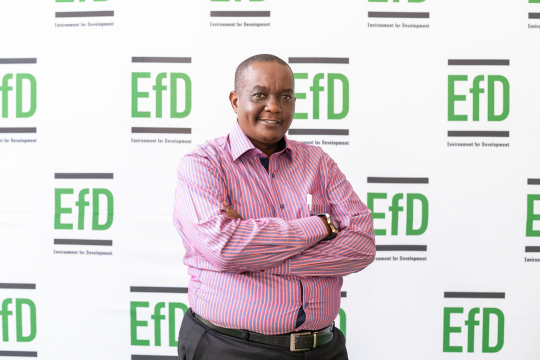Professor Richard Mulwa is the Director of EfD Kenya, which hosted EfD’s Annual Meeting this year. He has been a part of the core EfD team almost since the organization's inception in 2007. He and his team hosted about 180 participants worldwide, participating in an intense program of workshops, meetings, and other activities. According to the host, it’s a lot of hard work but also very rewarding. Here are some of his reflections during the meeting.
How are things going?
Quite well! The local team is getting a lot of credit for their work. Of course, every meeting has its challenges, like technical issues. We had some senior speakers for the opening session who had to cancel on short notice, like the Energy Department's Principal Secretary. But what can you do when the president calls? Policy Day was very successful. The opening ceremony was very appreciated with its warm informal feeling.
What are the benefits for EfD Kenya to host the Annual Meeting?
It will put EfD on the map of environmental research in the country. It will give our center a lot of visibility. Hopefully, many institutions, ministries, development partners, and others will think of us as the center to go to when they face environmental and development challenges. From a center perspective, I’m also sure that we will get more recognition from the University of Nairobi when they realize the significance of the whole EfD network.
I also think it is a great advantage for EfD globally that we meet here since Nairobi is a regional hub for many international organizations, such as UNEP, FAO, GIZ, and the UN.
What can you say about the Policy Day that took place the day before the Annual Meeting?
That was a unique event, with policymakers from five countries, researchers, practitioners, and civil society coming together to discuss a transition to clean energy. We had a strong line-up of speakers, fantastic round-table discussions, and a panel summarizing the discussions, so it was a fantastic opportunity to exchange knowledge and experiences. The participants were actively contributing to the discussions. Afterward, we will publish the outputs of the discussions, and I believe we will have a great impact.
What do you see as the biggest environmental challenges for Kenya
The triple planetary crisis – pollution, climate change, and biodiversity loss – is very challenging for Kenya as well. Our waste system is far from sustainable. Climate change has hit hard on us with astronomical floods. It will take a long time for us to recover from those. Biodiversity loss is apparent everywhere due to population increase, economic demands, expansion of agriculture, and the expansion of settlements.
What is the way forward for your country to address those challenges?
We’re looking at all the problems and are taking some steps. For pollution, we have the Sustainable Waste Management Act of 2022, which is meant to revolutionize how we deal with waste and implement a circular economy. It defines the players and the management of sustainable waste management, for instance, who is responsible for recycling, who should be involved, and what the role of the private sector, civil society organizations, and government is. The Climate Change Act of 2016 regulates how we should deal with that problem. It can’t be a government solution only, but businesses, civil society, development partners, and others must share the responsibility. We also have the Energy Transition and Investment Plan 2023-2050, which is the government plan for investments in sustainable energy, improvements in energy efficiency, transitioning to electric vehicles, etc. For biodiversity, our country has committed to the global 30x30 initiative (preserve 30% of the areas and species by 2030.) We have the maps, but it’s a long way to go and a lot of work.
What is EfD Kenya’s role in that development?
Our researchers are touching on each of those areas and trying to influence policies. Of course, we have a limited number of researchers and limited resources, but we interact with the government’s policymakers, civil society, and international organizations. We have, for instance, a collaboration with the Swedish Embassy on textile waste management. We are very active in the field of just transitions and just resilience: As we transform into a low-carbon economy, we must cushion the effects for those who lose. The adaptation measures must be fair and take care of the vulnerable. We have also researched water issues for over a decade and developed a close collaboration with Nairobi City Water and Sewerage Company. One study has led to another, and we have had a lot of impact on policies. They have now asked for our help to develop their research department.
This year’s EfD Annual Meeting is arranged in collaboration with AFAERE (the African Association of Environmental and Resource Economists). What are the implications of that, would you say? AFAERE is a very young organization – only six years old. This will be the first global meeting of the organization, and it will gain a lot of leverage from it. It will also be beneficial for the EfD network to get connected to a network that encompasses several more countries than the EfD countries.
Do you think there will be some long-term effects from hosting the EfD Annual Meeting?
Yes, over time I foresee an expansion of our center. As we become more well known I expect we will attract more collaborations, have more influence on policies, and expand the team we work with. Many research institutions focus on the environment and development, but our domain, using economic tools to solve problems, is unique. Five years down the line we may be a very big center that everyone wants to associate with.
By: Petra Hansson
